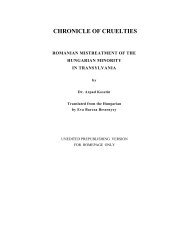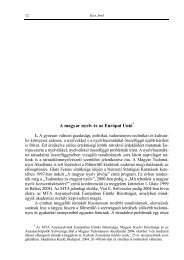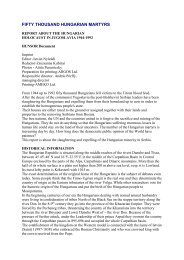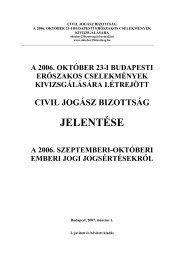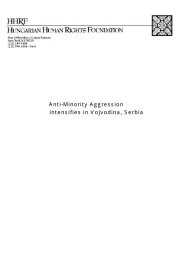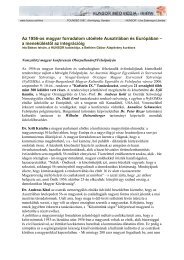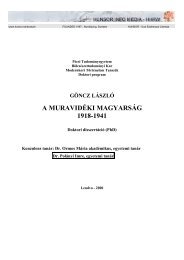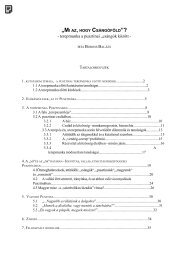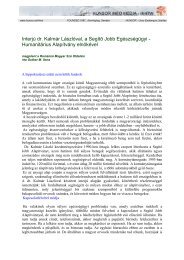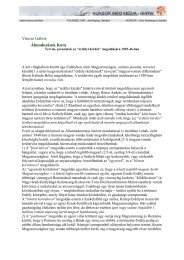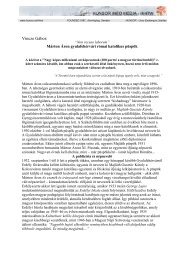The vengeance on the Hungarians, the idea of the vendetta, was implanted deeply in theminds of the partisan commissars who were in constant touch with their commander, GeneralRukovina. Rukovina in turn had to inform Marshal Tito about all his decisions and all the"military" achievements of his subordinates. In short, it is impossible that Tito, the supremecommander, was not informed at least once a week on how the purge or rather the slaughter ofthe "fascist" Hungarians was going forward.The Yugoslavian government, as soon as it got in touch with the new temporarydemocratic Hungarian government, declared its demand for an exchange of population. Theyoffered forty thousand Hungarians living in Bacska for the same number of Southern Slavs whowere to move there in their place. <strong>This</strong> demand, however, soon became obsolete not onlybecause the Serbs and Croats who remained in Hungary did not wish to move21to Tito's Yugoslavia but also because the Yugoslav authorities were well aware of the fact thatthe forty thousand Hungarians they offered had already been "resettled" in the next world.Jovan Veselinov Zharko, secretary of the Regional Committee of the Communist Party,said the following, on April 5, 1945, "We have changed our position towards the Hungarians, wemust improve their awareness of the fact, that they live in this country and should fight for it."<strong>This</strong> intention, however, was very hard to fulfil. First of all, the horrible weeks ofvengeance had to be covered over with a veil of deep silence and forgetfulness.In his <strong>book</strong> entitled "The Birth of the Autonomous Voivodina", Veselinov Zharko triesto draw a sharp distinction between himself and the murderous deeds that took place outside hissecret scope of authority in the autumn of 1944 in Bacska, "Certain chauvinist groups beganto emerge, which cried for vengeance on the whole Hungarian population. Due to them,serious mistakes and excesses took place, which certainly had their consequences. Instead ofcalling the real accomplices of the occupying forces to account, those who participated in theirnumerous crimes, in some villages they punished certain ethnic Hungarian civilians who hadnothing to do with the bestial crimes of the fascists.Certain persons coming from Yugoslavian headquarters along with other uninvited guestssneaking into Bacska also caused us some trouble. <strong>This</strong> applies especially to the NationalDefence Department (OZNA, Odeljenie za zastitu naroda), whose members for a whilepossessed the authority to arrest anybody without any obligation to inform the politicalleadership of the territory where they were operating..."The OZNA later became infamous under the name UDB (Uprava drzhavniebezbednosti, State Security Authorities).Of course, with such opinions Jovan Veselinov Zharko could not remain the head of theRegional Committee in Novi Sad for very long.The murder commands were issued and carried out without his participation. Later hesaid the following, "You must understand, everything that happened in those days wasinseparable from the Party. There was never any question about that."
22PEOPLE OF BEZDAN1.On a May afternoon, while I was dedicating copies of my newly published <strong>book</strong> forinterested readers in front of a major theatre in Budapest, a man in rural clothes approached meafter having gazed at me for a long time. He held a seemingly brand new copy of "Cold Days"in his hand and, answering my inquiring glance, he quietly said:"Are the Bezdan people in it?"I did not reach for his copy, the simply dressed man obviously did not want my signature, hewas only interested in the fate of the people of Bezdan. I knew that news of their fate had notreached my <strong>book</strong>.I was sitting in front of the theatre, a couple of metres away from the traffic, sheltered from thehot sun by a tent. The <strong>book</strong>seller girls had already mentioned that somebody from Bezdan hadbeen looking for me in the morning, but they had no idea where Bezdan was. So this curiousquestion, whispered in a low voice, did not take me by surprise."Should they be in it?""Of course they should," answered the Bezdan man, "because it belongs to it, we must notforget that.""Why do you think such a thin <strong>book</strong> should contain Bezdan?""For the things that happened there."I could have asked what of importance happened there, but instead, I was curious of thedate, when. I knew that the recollection of a date, of an exact day and hour is the weakestpoint: not only of most simple men, but of most educated men as well: if one wants to provethe incorrectness of an assertion. The Bezdan man was not embarrassed by this unexpectedquestion, the date was on the tip of his tongue as it must have been in his mind during theprevious twenty years:"November the third, nineteen hundred and forty four, from morning till late afternoon."There were more and more people gathering around us with <strong>book</strong>s in their hands. I askedhim twice to tell me about that event twenty years before, but my man could not say more than:"The soccer field...", and again, "the soccer field..."I had to realize that he was not willing to say anything more in23front of strangers, so I decided that once I was done with those who wanted my signature, Iwould take him to a nearby restaurant to try to loosen his tongue.Some minutes later I was already reading the menu, offering several good meals forlunch but he said he was not hungry and accepted nothing more than a glass of red wine. ThenI reminded him of the third of November for the third time."My only luck was that I had left for Baja on horseback on the evening of November thesecond," began the man at last, "because my brother-in-law had sent word that my sister Julismight give birth to her child any hour and he was still in service, and he didn't know if hecould stay with her. My mother didn't dare go, my father couldn't, because he was a deserterfrom the army and he spent most of his time in the attic behind the chimney. My little brother
- Page 3 and 4: Library of Congress Catalogue Card
- Page 5 and 6: Mutilation of the hands or feet wit
- Page 7 and 8: they wanted to belong. On the annex
- Page 9 and 10: individuals, then shooting them by
- Page 11: the Russians and under their protec
- Page 16 and 17: 26that those people all fell victim
- Page 18 and 19: ack a 13 year-old boy to the soccer
- Page 20 and 21: Russian officers cursed and told th
- Page 22 and 23: Jani was set free for he had been a
- Page 24 and 25: There were some people who, in spit
- Page 26 and 27: March 12, 1945. The relatives of th
- Page 28 and 29: Ferenc Csapo, 33 Mihaly Miovacs, 18
- Page 30 and 31: Having heard about the advance of t
- Page 32 and 33: "On November 3, I got up at five in
- Page 34 and 35: The vicar would come every night. H
- Page 36 and 37: hand. Raising it to his mouth, he d
- Page 38 and 39: "24th October, 1944. Yesterday was
- Page 40 and 41: "I have only one chance to be sacri
- Page 42 and 43: The data, which shows that on the s
- Page 44 and 45: all the captured Serbs, as neither
- Page 46 and 47: Before and during World War II, the
- Page 48 and 49: would order fire in an instant. Wit
- Page 50 and 51: Our house looked out over the main
- Page 52 and 53: He had just arrived home after thre
- Page 54 and 55: 28. Jozsef Pasztor, 34 56. Albert G
- Page 56 and 57: The OZNA officer, who exhumed a mas
- Page 58 and 59: 7917 year old Karoly and 8 year old
- Page 60 and 61: 82FROM SZENTFULOP TO THE GAKOVA CAM
- Page 62 and 63:
My mother died on January 4, 1946.
- Page 64 and 65:
Jozsi, the leader of our committee
- Page 66 and 67:
his own grave, then machine gunned
- Page 68 and 69:
driving a wheelbarrow on the sidewa
- Page 70 and 71:
"Now that's exactly what we needed
- Page 72 and 73:
15 Istvan Polyakovics, Zenta, 18861
- Page 74 and 75:
idge was built (from several rows o
- Page 76 and 77:
There is a common opinion among the
- Page 78 and 79:
The Catholics of the village were o
- Page 80 and 81:
and their supporters. On one occasi
- Page 82 and 83:
"My younger brother, Bandi, was tak
- Page 84 and 85:
two young instructors staying in he
- Page 86 and 87:
In Tunderes (Vilova) there was no o
- Page 88 and 89:
weeks spent starving, laying on str
- Page 90 and 91:
121PACSERAt Pacser sixteen Serbians
- Page 92 and 93:
piece of land, there are three rows
- Page 94 and 95:
"I understood that through the OZNA
- Page 96 and 97:
took the priest under their protect
- Page 98 and 99:
"We set off from Hadikliget on Octo
- Page 100 and 101:
everyone to the front! The Party us
- Page 102 and 103:
137REPORT OF LOSSESIn addition to o
- Page 104 and 105:
141Source: Zlocini okupatora u Vojv
- Page 106 and 107:
well as in words, that there had be
- Page 108 and 109:
The American military forces delive
- Page 110 and 111:
culpability or participation are th
- Page 112 and 113:
The accused did not make use of his
- Page 114 and 115:
the spirit of revenge among the Hun
- Page 116 and 117:
considered all the claims of Hungar
- Page 118 and 119:
The People's Court of Budapest just
- Page 120 and 121:
From then on all hell breaks loose.
- Page 122 and 123:
Recommended readingeRudolf Kiszlion



